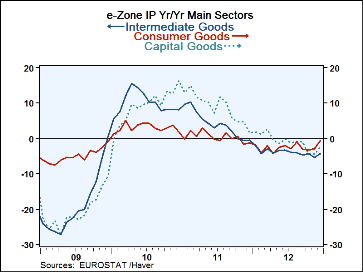 Global| Feb 14 2013
Global| Feb 14 2013EMU IP Also Rises
Summary
EMU IP is showing a gain in December of 1%. Month to month. It is still falling over 3-Months and six months and 12-months. But the pace of its decline is slowing. Output in the EMU region is still some 5.2% below its past cycle peak. [...]
 EMU IP is showing a gain in December of 1%. Month to month. It is still falling over 3-Months and six months and 12-months. But the pace of its decline is slowing. Output in the EMU region is still some 5.2% below its past cycle peak.
EMU IP is showing a gain in December of 1%. Month to month. It is still falling over 3-Months and six months and 12-months. But the pace of its decline is slowing. Output in the EMU region is still some 5.2% below its past cycle peak.
Despite the improvement the pattern of the drop has IP falling at a very sharp 9.8% annual rate in Q4. But because IP hit its low point in the middle of the quarter (November) and has had a rise in December, should production be flat in January it will post a positive growth rate of 2.7% annualized over the fourth quarter average. Despite the bad Q4 result output is already on path to do some good if the one month gain in output does not prove to be a fluke.
Both consumer goods and capital goods output rose in December with intermediate goods output suffering a drop of -0.2%.
Across seven selected EMU members output in December advanced in six of them falling only in Portugal in December. Over three months output in France and in Germany is contracting while output in Finland, The Netherlands, Spain, Ireland, Greece and Portugal is increasing. It is the middle and weaker countries in the Zone that have been experiencing some revival. Still, that is a very short-term phenomenon as output is down six of these seven countries over six-months and in five of seven over 12-months.
In terms of EMU sector trends consumer goods output is advancing over three-months and rather strongly at a 6.7% annual rate. It is up by a small amount over six months and yet it is still lower Yr/Yr. Consumer durable goods trends are still deeply negative. Intermediate goods also are declining at progressively faster rates over shorter periods. Capital goods output has been in a steady 2% decline but that has stepped up to a 4.5% pace of decline over three-months. The sector news is only positive for consumer nondurables and that is offset by durable goods weakness.
On balance there are hints of EMU IP doing better. But the trends are not wholly positive. The most positive news is in December alone. But taken out of context there is still a lot of surrounding weakness. It's too soon to declare that an improvement is in train. But it's also not possible to deny it.
Robert Brusca
AuthorMore in Author Profile »Robert A. Brusca is Chief Economist of Fact and Opinion Economics, a consulting firm he founded in Manhattan. He has been an economist on Wall Street for over 25 years. He has visited central banking and large institutional clients in over 30 countries in his career as an economist. Mr. Brusca was a Divisional Research Chief at the Federal Reserve Bank of NY (Chief of the International Financial markets Division), a Fed Watcher at Irving Trust and Chief Economist at Nikko Securities International. He is widely quoted and appears in various media. Mr. Brusca holds an MA and Ph.D. in economics from Michigan State University and a BA in Economics from the University of Michigan. His research pursues his strong interests in non aligned policy economics as well as international economics. FAO Economics’ research targets investors to assist them in making better investment decisions in stocks, bonds and in a variety of international assets. The company does not manage money and has no conflicts in giving economic advice.
More Economy in Brief
 Global| Feb 05 2026
Global| Feb 05 2026Charts of the Week: Balanced Policy, Resilient Data and AI Narratives
by:Andrew Cates






